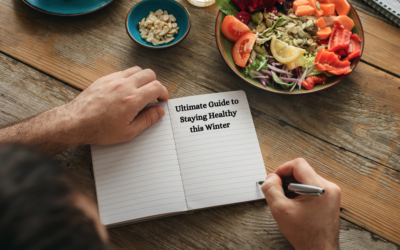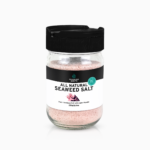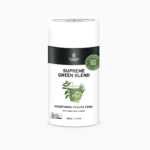Cakes, cookies, chocolates…Many people love a sweet treat.
But sugar, and especially added sugar, is one of the biggest threats to your health and wellbeing. Although we know that too much sugar leads to weight gain, the other ways that sugar can damage your health aren’t always visible. A prime example of this is the damage it can cause to your gut microbiome.
The Importance of Your Gut Microbiome
The term “microbiome” refers to all the bacteria that lives in and on your body. Each species of bacteria is required to play a particular role in your body. The microbiome is so important that scientists think of it as an organ of the body. This is because the microbiome encodes over three million genes, producing thousands of metabolites. These metabolites all have a major influence in your fitness, phenotype (observable traits like behaviours and eye colour), and overall health. Your microbiome comprises up to 1,000 species of bacteria. These microorganisms take care of numerous processes within the body: immune function, digestion, absorption of nutrients, mood and cognitive function, skin health, and so much more. The gut microbiota also provides a means for the fermentation of non-digestible substances such as dietary fibers and intestinal mucus.
This fermentation is essential for the growth of special microbes that produce short chain fatty acids and other nutrients. Unfortunately, the modern Western lifestyle is not always good for your microbiome! Antibiotics, pesticides, toxins in food, stress, alcohol and many other everyday factors are very harmful to this delicate microbial balance. One of the worst offenders is also one of the most difficult to avoid. Sugar!
How Sugar Affects Your Gut Microbiome
When your gut bacteria are healthy, so are you! You have plenty of energy, your immune system fights off illnesses, you sleep well and you feel good inside and out. But when your gut bacteria are overwhelmed by pathogens and yeast, the effects are obvious. Too many bad bacteria mean that you cannot break down nutrients in the food you eat, which in turn means you miss out on valuable vitamins and minerals. You may also suffer from unpleasant symptoms of poor digestion, and become more susceptible to colds and flu.
You see, the bacteria in your gut need to be looked after. They need prebiotics to feed on, and a steady supply of probiotic-rich foods to support their environment. But when you eat a diet high in sugar, the bacteria you are supporting are the bad ones. Sugar is the fuel for yeasts like Candida albicans and other undesirable microorganisms. It allows them to thrive and grow out of control, causing your beneficial bacteria to suffer. One study involving mice showed what happens when you eat a lot of sugary foods. The mice were fed a high-sugar diet for several weeks, and then their cognitive function was tested.
They were found to have reduced cognitive flexibility, which means they were less able to switch between concepts. They also suffered impaired memory. Incredibly, this was all due to changes in their gut microbiota. It’s also been found that a high intake of sugar can slow down your bowel transit times (the time it takes for waste to be moved out of the body). This can mean that harmful toxins in your waste spend more time in your gastrointestinal tract, where they can be reabsorbed into the bloodstream. They can also cause digestive symptoms such as gas, bloating and other problems.
Worse, the dysbiosis caused by a high-sugar diet can lead to an increase in the production of endotoxins, which are associated with many chronic diseases. This Is because the ‘bad’ bacteria and yeast damage the sensitive lining of the gut, triggering pro-inflammatory processes in the body. The gut mucosa plays a vital role as a defense barrier in the intestines. When the cells are damaged, the tight junctions that form the barrier become loose or permeable. This is referred to as Leaky Gut Syndrome, and can lead to food allergies and intolerances.
Sugar also provides the environment that Candida needs to survive. Foods high in sugar, gluten or artificial ingredients create inflammation and imbalanced conditions that support harmful yeast – while making it more difficult for healthy bacteria to compete.
The Many Faces of Sugar
Sugar isn’t always easy to spot. While most of us know to check nutrition labels for sucrose, glucose and fructose, sugar can come under a variety of other names such as high-fructose corn syrup, maltodextrin, molasses and barley malt extract. Artificial sweeteners may lack the calories of sugar, but they certainly aren’t a healthy option! Often present in processed foods, many artificial sweeteners are toxic chemicals that can damage your microbiome as much as added sugar. Sugar alcohols such as sorbitol, xylitol and mannitol may be safe in moderation, but large amounts can irritate the gut and cause bloating and diarrhea. Natural sugars do exist, such as honey, agave, maple syrup and coconut sugar, but remember – they’re still sugar, so it’s important not to overdo them. Another natural alternative is Stevia, which you can read more about here.
Go Sugar-Free for Better Gut Health
The best way to heal your gut and fight pathogens like Candida is by restricting the sugar in your diet. Read the nutrition labels on the foods you buy to check for those hidden sugars. Try to choose natural sugars where possible, but don’t go overboard. Removing the sources of ‘fuel’ for harmful yeasts and bacteria will help to weaken them, so that treatment will be more effective.
Cut back on your intake of alcohol, sweets, bread and sweet fruits such as bananas and dates. But you don’t have to go hungry! Simply replace these foods with more satisfying ones that are high in protein and healthy fats. That means avocados, nuts, chia seeds, oily fish, and brightly-colored vegetables. The less sweet, the better – and you’ll stop craving those sweet flavors, too!
Lisa Richards
https://www.thecandidadiet.com/
—
The Nutrition Academy runs a Microbiome Course. For more details, click here.








Hi Lisa, why cut back on vinegar? I have a tbsp daily with my (diluted) apple juice and water. Thought I was doing a good prebiotic thing.
Hi Ali. Lisa was referring to distilled white vinegar, which she says is not a particularly healthy choice. She says that vinegar with the ‘mother’, for example apple cider vinegar, is much healthier. We have updated the article to reflect this – sorry for any confusion 🙂
Hi!
In general, if cutting out refined sugar and being restricted with natural alternatives such as monk fruit and maple syrup, how long does it take to heal candida?
Kind regards,
Alexandra
Hi Alexandra. Thanks for getting in touch. This is a hard one to answer as everyone is different. You might find these blogs useful, though: https://changinghabits.com.au/blog/2017/02/28/signs-you-might-have-candida-and-what-you-can-do-about-it/ and https://changinghabits.com.au/blog/2017/09/12/stop-masking-your-symptoms-and-start-listening-to-them/ Good luck 🙂